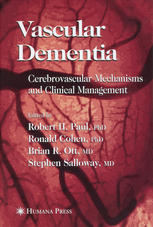

Most ebook files are in PDF format, so you can easily read them using various software such as Foxit Reader or directly on the Google Chrome browser.
Some ebook files are released by publishers in other formats such as .awz, .mobi, .epub, .fb2, etc. You may need to install specific software to read these formats on mobile/PC, such as Calibre.
Please read the tutorial at this link: https://ebookbell.com/faq
We offer FREE conversion to the popular formats you request; however, this may take some time. Therefore, right after payment, please email us, and we will try to provide the service as quickly as possible.
For some exceptional file formats or broken links (if any), please refrain from opening any disputes. Instead, email us first, and we will try to assist within a maximum of 6 hours.
EbookBell Team

4.4
32 reviewsWith an aging population suffering from a high level of cardiac and cerebrovascular disease, it has become increasingly clear that the time may be ripe for a deeper understanding of vascular disease (VaD). In Vascular Dementia: Cerebrovascular Mechanisms and Clinical Management, a panel of multidisciplinary experts summarizes our current understanding of the biological and clinical aspects of the condition. The authors describe the basic mechanisms associated with aging and cerebrovascular disease that may play an important role in the development of VaD, and identify its impact on cognitive status, psychiatric health, and the ability of patients to complete the tasks of daily living. Additional chapters address the pharmacological management of vascular dementia and the use of neuroimaging methods to investigate it, with particular attention devoted to both functional and structural imaging techniques. The complex relationship between VaD and Alzheimer's disease (AD) is fully explored, with chapters on how these processes may interact and how one disease may lower the threshold for clinical expression of the other. The authors also consider the impact of VaD on the perceived quality of life of patients and caregivers, two issues rarely discussed in the scientific community.
Comprehensive and thoroughly up-to-date, Vascular Dementia: Cerebrovascular Mechanisms and Clinical Management offers both clinicians and basic scientists a wide ranging account of this rapidly developing field, explores the direction of future VaD studies, and authoritatively describes today's optimal therapeutic approaches.